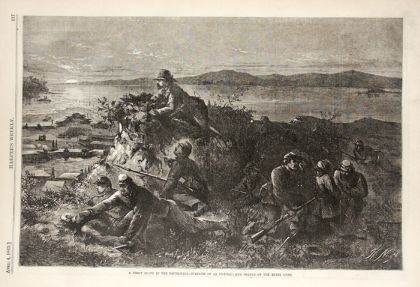
Heroes of America (HOA), also referred to as the "Red Strings," was an underground, pro-Union organization operating in North Carolina, Virginia, West Virginia, and perhaps other southern states during the Civil War. Its ranks were composed mainly of deserters, draft dodgers, and Unionists as well as some enslaved and free black people, and its purpose was to protect its members from Confederate authorities. The members engaged in a range of subversive activities, including encouraging disloyalty on the home front and desertion in the Confederate army, providing military intelligence to Federal authorities, maintaining an underground railroad to transport members to the Union lines, and promoting the formation of anti-Confederate guerrilla units. The HOA also promised to the poor a postwar redistribution of the wealth of the planter-enslaver class, which they hoped would lessen class divisions.
The HOA likely had its roots in a group of armed Unionists who emerged in central North Carolina in July 1861. Confederate troops quelled the insurgency and charged the men with treason. The best-known organizer and leader of the HOA was John Lewis Johnson, a pharmacist and physician. The organization's Grand Council, formed in Raleigh, became the center of HOA activity. Johnson eventually inspired the establishment of a National Grand Council in Washington. The HOA strongly supported the peace movement begun in 1863 by William W. Holden, editor of the Raleigh-based North Carolina Standard. In 1864, when Holden challenged incumbent Zebulon B. Vance for governor, the leader of the peace movement was publicly accused of being a leader in the disloyal HOA. Fearing reprisals, few of Holden's supporters showed up to vote for him, and Vance won by a landslide. With Holden's defeat, the HOA ceased to play a role in the politics of Confederate North Carolina.
Through the efforts of North Carolina members, however, the HOA had spread to southwestern Virginia. By the winter of 1864, bands of Confederate deserters and Confederate-disloyal county officials, many of whom belonged to the Red Strings, controlled much of the region. During Reconstruction, the HOA protected its members (including numerous Union army veterans from North Carolina) from hostile ex-Confederates. In the gubernatorial campaign of 1868, the HOA aligned itself predominately with the "scalawag" wing of the Republican Party, supporting the winner of the election, William W. Holden.
During the Civil War and Reconstruction, members of the HOA were prime examples of the "Other South." They were southern whites who, during the war, opposed the Confederacy and, during Reconstruction, supported the Republican Party. Their story challenges the often-held view that the nineteenth-century South was monolithic in its beliefs and attitudes.